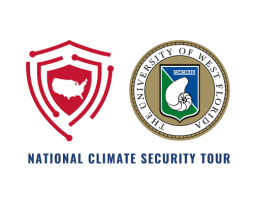Climate Security in Northwest Florida: Best Practices and Lessons Learned for Military Facility Resilience

Climate Security in Northwest Florida: Best Practices and Lessons Learned for Military Facility Resilience
Northwest Florida is home to some of America’s most significant and simultaneously most vulnerable military installations. Not only does the region boast several major facilities such as Pensacola Naval Air Station, Eglin Air Force Base, Hurlburt Field, and Tyndall Air Force Base, but the adjoining naval ranges and air corridors in more than 180,000 square miles of Department of Defense controlled airspace extending out into the Gulf of Mexico are an invaluable and irreplaceable asset for the U.S. military. Yet, the DoD ranks Northwest Florida’s bases as among the most exposed to climate change in the country. Climate-induced extreme weather phenomena, flooding, and sea-level rise not only costs the U.S. military billions of dollars in damaged facilities and equipment, but also in terms of readiness, training, and personnel. Join ASP and the University of West Florida on April 24th for an in-person public panel discussion exploring the key role Northwest Florida plays in enhancing national security, the consequences of climate insecurity, and climate resilience strategies for the cities and municipalities that surround U.S. military installations.
Moderated by Dr. Matthew Schwartz from the University of West Florida, panelists include: CAPT Tim Kinsella, USN (Ret.), CAPT Rick Miller, USN (Ret.), Dr. Haris Alibašić, Dr. Brian Crisher, and Eric Christianson.
